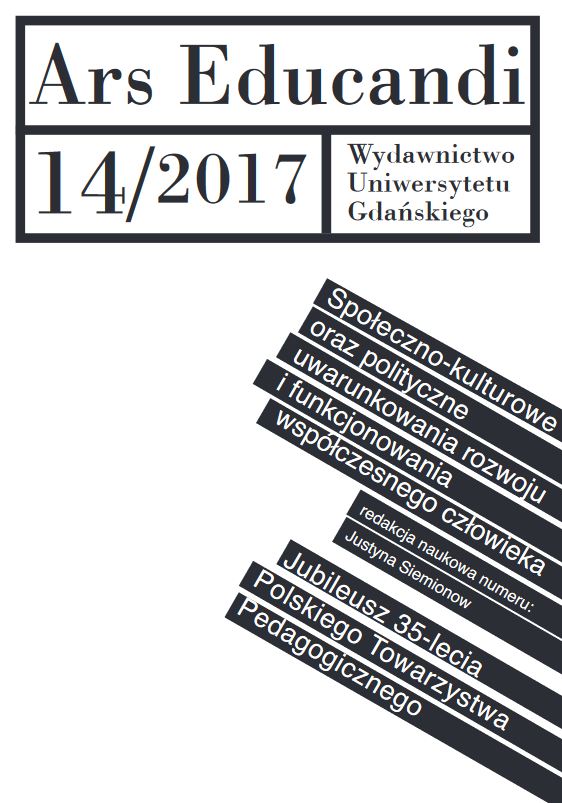The zoo as a socialisation project
DOI:
https://doi.org/10.26881/ae.2017.14.09Keywords:
zoo, posthumanism, animal studies, laboratisation, knowledge, power, gazeAbstract
The epistemological status of the zoo can be seen as a process of knowledge-power which supports something more than the Cartesian model of science. A visit to the zoo is a historical journey to the source of the cognition paradigm. Seeing animals in cages is the first lesson of what human perception should be like. It leads to adopting the attitude of gaining experience by homogenizing its contents from the natural environment. Animals were turned into the object of cognition by depriving them of subjectivity. As a content of knowledge, it is formulated in a closed system cage – pen – aquarium, which is a representation of laboratization of nature. Just like panopticon the tradition of zoological gardens and the discourse shaped around them teaches that the production of objectivity = normativity is a process of constructing the conditions of human perception in the form of a knowledge-power relation.

Modernisation of the journal's operations and translation into the English language of articles published in Ars Educandi in 2012-2017 were financed with funds from the Ministry of Science and Higher Education as a part of the task Science Promotion Activity (pl. DUN).
The task ‘The implementation of the editorial module on the platform of Uniwersyteckie Czasopisma Naukowe – a system facilitating the editing and management of the academic journal Ars Educandi‘ was financed as a part of contract 661/P-DUN/2018 of 12.06.2018 from funds of the Ministry of Science and Higher Education designated for the promotion of science.
The task ‘The creation of a modern online version of the academic journal Ars Educandi through the implementation of the publication module on the platform of Uniwersyteckie Czasopisma Naukowe and the handling of international indexing databases’ was financed as a part of contract 661/P-DUN/2018 of 12.06.2018 from funds of the Ministry of Science and Higher Education designated for the promotion of science.
The task ‘Preparation of the English language version of the last 6 annual issues (2012-2017) of the academic journal Ars Educandi and their publication online’ was financed as a part of contract 661/P-DUN/2018 of 12.06.2018 from funds of the Ministry of Science and Higher Education designated for the promotion of science.
Downloads
References
Afeltowicz Ł., Pietrowicz K., 2009, Czy socjologowie są w stanie budować maszyny społeczne?, „Kultura i Społeczeństwo” nr 1.
Agamben G., 2008, Homo sacer: suwerenna władza i nagie życie, tłum. M. Salwa, Warszawa: Prószyński i S-ka.
Derrida J., 2008, Zwierzę, którym więc jestem (dalej idąc śladem), tłum. M. Koza, http://www.academia.edu/3316323/Jacques_Derrida_Zwierze_ktorym_wiec_jestem_dalej_idac_sladem_ [dostęp: 13.10.2017].
Foucault M., 2009, Nadzorować i karać: narodziny więzienia, tłum. T. Komendant, Warszawa: Aletheia.
Foucault M., 2006, Słowa i rzeczy: archeologia nauk humanistycznych, tłum. T. Komendant, Gdańsk: słowo/obraz terytoria.
Gucwiński A., Strojny W., 1977, Znajomi z zoo, Warszawa: Państwowe Wydawnictwo Rolnicze i Leśne 41.
Haraway D., 2008, Wiedze usytuowane. Kwestia nauki w feminizmie i przywilej ograniczonej/częściowej perspektywy, tłum. A. Czarnacka, http://www.ekologiasztuka.pl/pdf/f0062haraway1988.pdf [dostęp: 13.10.2017].
Horkheimer M., Adorno T., 2010, Dialektyka oświecenia: fragmenty filozoficzne, tłum. M. Łukasiewicz, Warszawa: Wydawnictwo Krytyki Politycznej.
Jamieson, D., 2011, Przeciw ogrodom zoologicznym[w:] W obronie zwierząt, red. P. Singer, tłum. M. Betley, Warszawa: Czarna Owca.
Linneusz K., 1776, Systema naturae, s. 13, za: M. Foucault, 2006, Słowa i rzeczy: archeologia nauk humanistycznych, tłum. T. Komendant, Gdańsk: słowo/obraz terytoria, s. 149.
Macnaghten P., Urry J., 2005, Alternatywne przyrody, tłum. B. Baran, Warszawa: Scholar.
McCartney P., 2010, If slaughterhouses had glass walls, everyone would be vegetarian, https://www.youtube.com/watch?v=odgldsDVDis [dostęp: 13.10.2017].
McClintock A., 1995, Imperial leather: race, gender and sexuality in the colonial contess, New York–London: Routledge, http://selforganizedseminar.files.wordpress.com/2011/07/mcclintock_imperial-leather.pdf [dostęp: 13.10.2017].
Paglia C., 1990, Sexual Personae: art and decadence from Nefertiti to Emily Dickinson, London: Yale University Press.

 Academic Scientific Journals
Academic Scientific Journals




